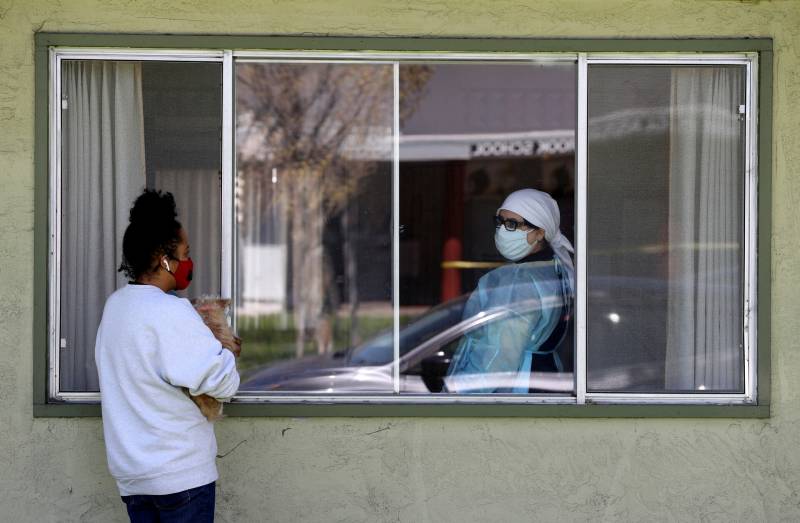ALAMEDA: Alameda County doesn’t test everyone at long-term care facilities, even where there’s an outbreak. The county has identified concerns about “ongoing limitations in testing resources and personal protective equipment,” and acting public health officer Dr. Erica Pan has emphasized that tests should have a purpose, and should be able to prompt a specific response. County officials say they’re following the state’s guidance.
Greg Shaw, a registered nurse working at the Rehabilitation Center of Oakland, says Alameda County should routinely test at nursing homes, as San Francisco and New York are doing. “We’re not very protected in the time before we have an outbreak,” he says, noting that transmission doesn’t require symptoms, tests take time, facilities are crowded, and protective gear is rationed until cases are confirmed. “I urge you to — quicker than you imagine it’s possible — start the type of testing where it’s regular and sweeps through everyone possible,” says Shaw.
CONTRA COSTA: County officials say they don’t plan to require universal testing at skilled nursing facilities, but they do presently encourage testing. As the state suggests, Contra Costa prioritizes testing in long-term care homes, including when there is an outbreak, and for new residents of facilities, as recommended by the CDC.
MARIN: County health officer Dr. Matt Willis says that he wants to test everyone at assisted living and skilled nursing homes, but doing so will take at least a month. Marin County has at least 70 group living situations licensed by state regulators; Willis says he would like to test sites every two weeks. A standing health order enables testing at facilities; Willis says more language would be necessary to require it.
As for controlling the spread of the virus, “We’ve done a lot of teaching in terms of infection control,” he says, because care homes lack training and equipment to handle this virus, especially compared to hospitals. Willis says facilities should share the burden and cost of testing with the county; some nursing homes have contracted for their testing entirely independently.
NAPA: The county is offering free testing for anyone who works and lives in Napa, but health officials have not said anything specific about group living circumstances.
SAN FRANCISCO: It’s complicated to require testing at skilled nursing facilities; San Francisco’s order, released May 7, is 19 pages long. San Francisco’s order specifically calls for “cooperation” from facilities; county health departments don’t have regulatory authority over skilled nursing homes, that’s the province of the California Department of Public Health. The order considers how to notify residents of facilities, obtain consent, and ask facilities to make records of testing. And tests might prompt “isolation, quarantine, cohorting of Residents or Personnel, and transfer of Residents.”
SAN MATEO: San Mateo County has not been testing everyone at licensed group living facilities during the coronavirus outbreak, but its health department says it has tested more than 700 people at more than 150 facilities around the county. Health officer Dr. Scott Morrow has asked the department to develop a plan for routine testing at assisted living facilities and nursing homes, and a statement from the county says “this aspiration is more feasible now.” Health officials will share the plan with county supervisors later this month.
SANTA CLARA: County health officials say that skilled nursing facilities “should” test all workers, patients who have symptoms and patients who report possible exposure. Santa Clara investigates suspected and confirmed coronavirus cases at skilled nursing facilities; some of those investigations may prompt testing and site visits. The county advises workers at care facilities who develop symptoms to tell their employers and follow their employers’ directions. Santa Clara reports daily updated totals for cumulative cases at long-term care facilities.
SANTA CRUZ: “We don’t have a specific order” on testing in assisted living and nursing homes,” says communications manager Jason Hoppin. “But we do plan to offer it to everyone. I don’t know if it’s going to be mandatory.”
SOLANO: Medical officer Dr. Bela Matyas says the county is hoping to focus testing at long-term care facilities, but added, “it’s just a goal. We don’t have at the moment the resources or the bandwidth to test all of our nursing homes, staff and residents.” Matyas says the county has emphasized additional training on universal precautions like hand-washing, echoing Marin’s Dr. Matt Willis: “It’s not that the people are less competent or less smart in either of these facilities,” Matyas says. “It’s that the tools are used so much more frequently in hospital environments that it’s second nature.”
SONOMA: The health department is conducting “enhanced surveillance” at care facilities and other group living environments, like homeless shelters and jails. As part of that effort, disease control specialists have been testing a small sample of the population at between five and ten facilities a week. “We visit facilities and test symptomatic and asymptomatic residents and staff, in an effort to catch any cases before they become an outbreak,” says county spokeswoman Jennifer Larocque. When sampling in group living settings, Larocque says county officials seek out higher risk individuals: residents who have trouble eating or moving (and thus may come into contact with more surfaces and other people), and workers who may visit multiple facilities. She says the longer-term goal is to test everyone at these facilities at regular increments.
